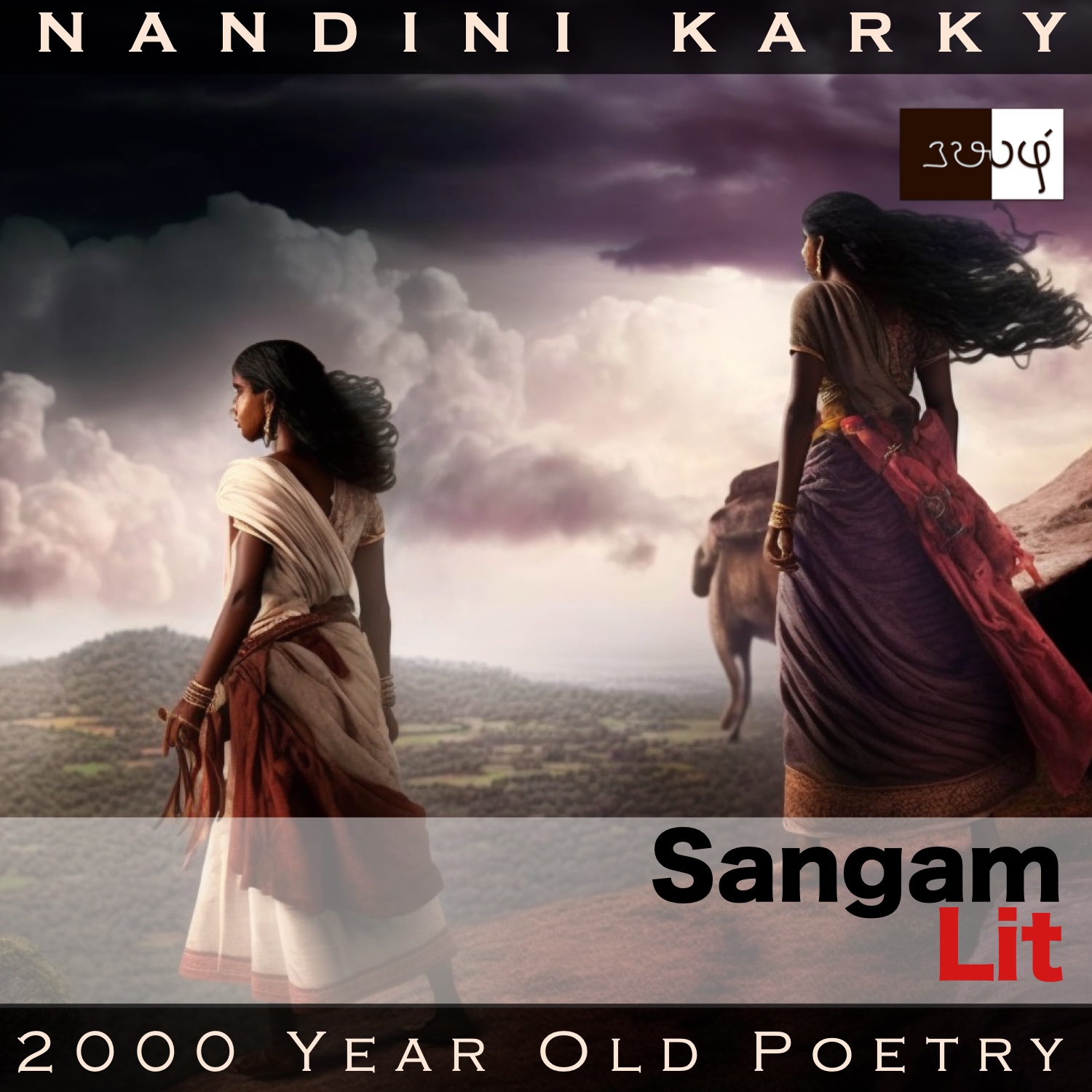Podcast: Play in new window | Download
Subscribe: Apple Podcasts | Spotify | Amazon Music | Android | iHeartRadio | Email | TuneIn | RSS | More
In this episode, we listen to an account of how life has changed after a momentous event, as portrayed in Sangam Literary work, Puranaanooru 116, penned about the Velir King Vel Paari by the poet Kabilar. The verse is situated in the category of ‘Pothuviyal Thinai’ or ‘miscellaneous matters’ and talks about the past and present in the life of the king’s daughters.

தீம் நீர்ப் பெருங் குண்டு சுனைப் பூத்த குவளைக்
கூம்பு அவிழ் முழுநெறி புரள்வரும் அல்குல்,
ஏந்து எழில் மழைக் கண், இன் நகை, மகளிர்
புல் மூசு கவலைய முள் மிடை வேலி,
பஞ்சி முன்றில், சிற்றில் ஆங்கண்,
பீரை நாறிய சுரை இவர் மருங்கின்,
ஈத்து இலைக் குப்பை ஏறி, உமணர்
உப்பு ஒய் ஒழுகை எண்ணுப மாதோ;
நோகோ யானே; தேய்கமா, காலை!
பயில் பூஞ் சோலை மயில் எழுந்து ஆலவும்,
பயில் இருஞ் சிலம்பில் கலை பாய்ந்து உகளவும்,
கலையும் கொள்ளாவாக, பலவும்
காலம் அன்றியும் மரம் பயம் பகரும்
யாணர் அறாஅ வியல் மலை அற்றே
அண்ணல் நெடு வரை ஏறி, தந்தை
பெரிய நறவின், கூர் வேல் பாரியது
அருமை அறியார், போர் எதிர்ந்து வந்த
வலம் படு தானை வேந்தர்
பொலம் படைக் கலி மா எண்ணுவோரே.
A long song with intricate details about Paari’s land. The poet’s words can be translated as follows:
“Fully blossomed flowers of the fragrant water lily that blooms in deep springs with sweet waters sway on the waists of maiden with pleasant smiles and upraised beautiful rain-like eyes. To look at the path ahead filled with grass, near their huts fenced with thorns, with cotton falling on their courtyard, and where ridge gourd and bottle gourd spreads, climbing atop fallen palmyra leaves, they now count carts of salt merchants! Seeing this, I suffer so. May the days of my life fade away!
In the forests, densely filled with flowers, peacocks rise and dance, and in the dense and dark mountain slopes, male monkeys pounce and dash about. More than what these male monkeys can eat, and unseasonably too, the trees bear so much fruit in those wide mountains with endless prosperity. Here, climbing atop the esteemed hill, back then, they used to count the proud saddled horses, belonging to the armies of kings, who came to wage war, not knowing the greatness of their father Paari, the one with sharp spears and flowing toddy!”
Time to explore the nuances here. The poet starts by talking about the attire of young maiden, who seem to have winning smiles and to use this poet’s favourite expression for feminine beauty – rain-like eyes. This attire is a string of bud-open, huge water-lilies around the waist of these maiden. After describing their appearance and attire, the poet moves on to their abode. This is a humble hut, fenced with thorns, near a grass-covered path that trails off to a great distance ahead. In the front yard of this hut, cotton floats around, perhaps from the silk-cotton tree nearby, and in the backyard, ridge gourd and bottle gourd vines spread all around. Now, the poet comes to what these maiden are engaged in. They have climbed on top of a heap of palmyra leaves and are now engaged in counting the carts of salt merchants traversing on that path, near their hut.
Seeing this scene, the poet is in so much suffering that he wishes for his life to end. When we investigate why this is so, we find out it’s because he compares the state of these women to how they were before. Once again, he turns to detailing the surroundings of dense forests where peacocks and monkeys abound and the trees in this forest bearing so much fruit, not minding if it’s the season or not, so much so that those hungry monkeys cannot finish them all. Such is the seemingly ceaseless prosperity of that land. Here, those same maiden used to climb on a high hill, and count the horses of enemy kings, who came to attack their father, Paari, not realising that he was indefeasible!
And thus, by detailing what these maiden, the king’s daughters were counting before and after his passing away, the poet shows to us, the changing story of their lives. One was filled with fertility and security and the other was filled with poverty and uncertainty. This changed state of the king’s daughters is what fills the poet’s heart with so much pain. I was intrigued to note that comment about fruits blooming out of season. It’s as if the king’s presence makes the trees think, ‘Never mind if it’s not the time, in this good country, we always need to bear fruit’. An interesting ‘before and after’ account of the lives of princesses, bridged by the simple thought of what was being counted!




Share your thoughts...